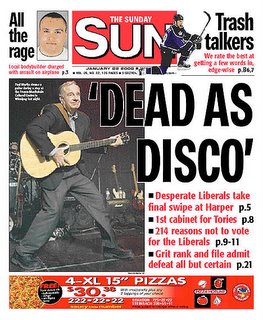There has been much discussion over the past few years over changing our electoral system in Canada. It happened in BC with the Citizens' Assembly, and most recently was brought up again during a federal election leaders debate when NDP leader Jack Layton actually stated that "Canadians want a system of Proportional Representation." Well, sorry Mr.Layton, but this Canadian doesn't.
Proportional Representation (PR) is a greatly misunderstood electoral system. The common misconception is that it is a superior system to our current first-past-the-post model because it more accurately distributes seats to the percentage of the popular vote. And at the basic level that is correct, however, the devil, as they say, is in the details, and that is where PR runs into trouble.
For this argument, imagine a Parliament with 100 seats. For starters, it is not as simple as giving a party with 30% of the vote 30 of the seats. First of all, has anyone ever seen a party get a full % of support? How do you distribute a seat to a party who got 30.4% of the vote and a party who got 29.6%? Do both parties get 30 seats even though one party got .8% more of the vote, which might translate into tens of thousands of votes. So do those votes count? How can you fairly distribute a number that is not whole? The short answer is that you can't, not without great difficulty and concession. I realize that this would only impact 1 or 2 seats for a party, but under a PR system, minority governments are the standard, and in a minority government, 1 or 2 seats may make a huge difference.
The second problem stems from the first, but creates a broader issue. Does a party who gets 0.9% of the vote deserve a seat? If so, what about a party with 0.4%? or 0.3%? Where do we draw the line? What is the minimum percentage of popular support that a party must gain in order to gain a seat? This is a difficult question to answer for two reasons. One, Canada is made up of 10 very unique provinces, and so if we do creat a minimum threshold, do we make it a national threshold, or a provincial one? Consider the ramifications for the Bloc Quebecois, they stand at 45-50% support in Quebec, however, across Canada their support is only 18%. Therefore under PR would the Bloc be entitled to 50% of Quebec's seats or 18% of Canada's seats? The second problem lies with lesser known parties, it is common fact that a PR system leads to more political parties, and so by creating a minimum threshold (for example 5%) then you are effectively saying that voters for a party that only received 3% do not count, however those for parties who get over 5% do count. Again, this is a very complicated rule that needs to be clarified, and huge concessions would have to be made to get this done.
There is also a concern over the individual who gets elected under a PR system, because under PR you do not vote for the person, you vote only for the party. So it is the party who indicates who will assume the seats they have been awarded after an election. So who are we voting for? We don't know. Are they accountable to us? No, they are accountable to the party itself. Which MP would be considered my MP for my riding? There would not be traditional ridings, there would only be a set number of seats for the House to be distributed. I do not like any of these answers, and I'm sure I am not alone in that opinion.
Finally, Jack Layton would have us believe that his party is in support of PR because he wants what Canadians want, but he is mistaken in that. The primary reason that Mr. Layton wants a PR system is because his party has never represented what a majority of Canadians want. The truth is that parties with no hope of ever forming a government are always in favour of a PR system because they will fare better under that system. The NDP is very happy tipping the balance in a minority government parliament. Under PR, minority governments are the norm, and so under PR, the NDP will always have the balance of power in their hands. So why is this bad some of you may ask? The answer is that PR benefits parties like the NDP who have strong identified support in certain sectors, and who are unable to attract the mainstream or "average" voter. The NDP has never, and probably will never form a government in Canada because they do not speak for the average Canadian, their views do not represent those of a majority of Canadians. Because of this they want to change the rules so that they can reward themselves for only speaking for a certain group. So why should we reward parties who do not even attempt to attract the majority of Canadians with having the balance of power in a Parliament?
Our current system may not be perfect, but what it does is encourage political parties to represent all of Canada, and not only special interest groups (NDP), or one province (Bloc), or just one single issue (Green, Marijuana party). The reason this election is really just a two-horse race is because only the Liberals and Conservatives aim to represent all of Canada, and they do so by the rules of our current electoral system. We should not reward parties who do not want to play by the rules, we should not look to change our electoral system to Proportional Represenation.


